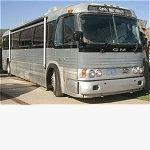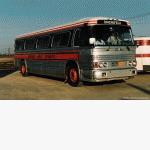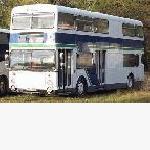| Author | Message | ||
| James Hetfeild (Mci_guy)
Registered Member Username: Mci_guy Post Number: 2 Registered: 7-2008 Posted From: 12.172.207.3 Rating: N/A |
Hello folks, I know you have probably been asked this question a thousand times but I am going to ask it again. Multi viscosity vs. straight weight engine oils. I have a 1989 MC-9 SE with 670,000 miles on it. Runs very good , consumes very little oil, pressure guage shows 65-70 psi at 1800 rpm. This bus has always used 15w40 - from day one. My question is: should I switch to 40 weight 2-stroke approved diesel engine oil? What are the pros and cons of switching after 670,000 miles of multi-viscosity use? Factors to consider: 6v92TA, 5 Speed Fuller, bus is "idled" very little - if it does idle it is always at 1000 rpm, bus is rarely driven below 1500 rpm, bus used primarily during summer. I have not (but will next oil change) performed an engine oil analysis. | ||
| Laryn Christley (Barn_owl)
Registered Member Username: Barn_owl Post Number: 487 Registered: 10-2006 Posted From: 153.2.246.32  Rating: N/A |
This is from the March '07 issue of BusRide. http://www.busride.com/Page.cfm/PageID/8607 ******************************************************************** A surprise find in the world of tribology Christopher W. Ferrone After many years of premature engine failures my frustrations turned to further investigation. For more than 25 years beginning with the Detroit Diesel (DDC) 92 series in 1981, I have researched ways to use quality lubricants and creative methods and intervals to extend the life of engine components. In 1995, I joined forces with Detroit Diesel to assist with a failure modes and effects study using my empirical fleet data on Series 92 engines. That project lead to a technical paper, single source part number (23514770) repair kit, and a national ad campaign to assist operators with the care and feeding of their Series 92 engines. As a result of emissions compliance the newer engines are 4-stroke cycle unlike the 2-stroke cycle of the 71 and 92 series. Other than the fact one is a 2-stroke and the other a 4-stroke, from a purely mechanical standpoint, these two engine types are similar in function and lubrication intervals. Since the crank journal is constantly under load as compared to the 4-stroke engines, the 2-stroke engines require a single-grade oil with a higher viscosity. The boundary lubrication never has a chance to recover for 2-stroke engines. In 4-stroke engines, the boundary lubrication does have a chance to recover during the non-loading turn of the crankshaft, which allows the use of multi-viscosity oils. The use of single viscosity oil in 4- stroke engines can actually extend the life cycle with really no downside. As our fleet became a mix of 2-stroke and 4-stroke engines, I was concerned with the accidental introduction of multi-viscosity oil into a 2-stroke engine, which, of course, would have led to a catastrophic failure. With this in mind, I called Detroit Diesel to discuss the use of single grade oil in a 4-stroke Series 60 engine. Told this would not be a problem, we began to replace engine oil in the Series 60 with single viscosity oil. Thanks to indoor parking, we can use XHD 40 weight oil in both the summer and winter. Where starting the engine in cold weather is a concern, simply use XHD 30 during the winter months. For fleets that still incorporate 2-stroke engines, this will not be an issue because they use a heavier single-grade oil anyway. With any one cylinder/piston and main bearing journal, the 2-stroke journal is under load with every turn of the crankshaft. In a 4-stoke engine, the journal is under load every other turn. A 2-stroke engine only uses single viscosity 30- or 40-weight engine oil. Oils for 4-stroke engines are generally multi-viscosity 15W-40. In some instances, the engine is acceptable to synthetic oils, which are outstanding for a number of reasons, but are very high priced compared to traditional engine oils. Having used this oil in DDC Series 60, Cummins 5.9L and PowerStroke 4-cycle engines for more than 10 years, the engines have never experienced a lubrication failure or shown any negative effects. In fact, the PowerStroke engine currently has 483,000 original miles all to the credit of single grade oil — well beyond its projected life cycle of 250,000 miles. The Cummins 5.9Ls also have lasted well beyond the expected life cycle. My original Series 60 test engine has 375,000 city miles, in addition to thousands of idle hours, which equates to almost 1.2 million highway miles. I attribute the additional success of these engines and their extended life cycle to the use of single grade (XHD 40) motor oil. Single grade oils are much less expensive than the synthetic oils recommended for 4-stroke engines. It is worth mentioning that in addition to extended engine life, specifically crankshafts and bearings, the peripherals such as turbochargers, air compressors and gear trains also benefit from the single grade oils. There is no need to keep two types of oils in the shop and run the risk of a mechanic accidentally pouring a multi-viscosity oil into a 2-stroke engine. Though this has been an ongoing process in our operations for more than 10 years with the utmost success and simplicity, it is still advisable to contact the engine dealer to confirm single grade oils are acceptable before making the switch. People may think I am crazy, but I use XHD 40 motor oil in all of my automatic transmissions and power steering as well. ******************************************************************** | ||
| James Hetfeild (Mci_guy)
Registered Member Username: Mci_guy Post Number: 4 Registered: 7-2008 Posted From: 12.172.207.3 Rating: N/A |
Thanks for the response. I agree single weight is the correct lubrication for a 2-stroke diesel. What about the fact that the bus ran 19 years with dual viscosity (15w40)? Is there a risk if I transistion to straight 40 (designed for diesel 2-stroke)? | ||
| Laryn Christley (Barn_owl)
Registered Member Username: Barn_owl Post Number: 488 Registered: 10-2006 Posted From: 153.2.247.33  Rating: N/A |
Straight is better even after 19 years. No problems switching. I use Exxon's XD brand but there are several good oils to choose from. Try these: http://www.tejascoach.com/tejasoil.html http://www.tejascoach.com/ddcoil.html | ||
| RJ Long (Rjlong)
Registered Member Username: Rjlong Post Number: 1404 Registered: 12-2000 Posted From: 67.181.166.160  Rating: N/A |
James - A 6V92TA with 675,000 miles on it? First or second rebuild? Or do you have that info? Real world 6V92TAs: Transit use (the hardest) usually made it to about 275 - 300K before overhaul. Line haul (think Greyhound) were in the 500K range. Charter bus use somewhere inbetween. I would be very surprised (after 25+ years in the bus industry) to see a 6V92TA going 675K without at least one, more likely two, rebuilds. Especially if all it's been fed is 15w40. FWIW & HTH. . .  | ||
| Bill Gerrie (Bill_gerrie)
Registered Member Username: Bill_gerrie Post Number: 179 Registered: 3-2006 Posted From: 209.50.72.2 Rating: N/A |
James Years ago it came up about single wt motor oil for 2 strokes. When an engine went in for warranty work at DD the first thing that was checked was piston scuff. This told them if the oil was multi wt or single wt. Multi wt oil in 2 stroke engine causes piston scuff so no warranty was allowed. I would highly recommend switching to 40 wt oil immediately. Like RJ says the engine may have been rebuilt a few times so do it now. Bill | ||
| James Hetfeild (Mci_guy)
Registered Member Username: Mci_guy Post Number: 5 Registered: 7-2008 Posted From: 12.172.207.3 Rating: N/A |
Hello I have no proof of engine rebuild. If there has been any work done to the engine I assume that it was an in-frame because there are no "new-looking" parts to the engine (it all looks 19 years old). As stated before, I am going to perform an engine oil analysis - maybe that will shed some light. | ||
| Bill Gerrie (Bill_gerrie)
Registered Member Username: Bill_gerrie Post Number: 180 Registered: 3-2006 Posted From: 209.50.72.2 Rating: N/A |
James Don't be alarmed when the oil analysis comes back with a bad report. Oil analysis are generally compared to the one done previous. It will give you a base line for next time and an idea of how much metal is in the oil from wear. Bill | ||
| Bruce Henderson (Oonrahnjay)
Registered Member Username: Oonrahnjay Post Number: 254 Registered: 8-2004 Posted From: 69.143.58.154  Rating: N/A |
I'm a little uncertain about how to take the info on "single weight oil". My bus engine is a 4-stroke and was originally specified 10W-30 "CC" (or diesel-rated) oil for -20F to 90F temps. This spec is from the '60's and I'm sure that modern diesel-rated ("CJ-4") oils like Rotella multi-grade (15W-40 etc) would give much better engine protection than ever imagined by the engine builders 50 years ago. I've started my bus at 26F temps after it had sat out all night and hadn't been run in a few days. It didn't "spring to life" like 70F but it started well and didn't show any sign of distress. I can't imagine that a straight-weight oil would allow this. I would like to keep the benefits of multi-grade oil in my 4-stroke. I don't have issues of multiple vehicles to consider, etc. What chance of excess wear or damage will I be running to stay with a modern multi-grade oil? Thanks for the expert guidance. | ||
| Bill Gerrie (Bill_gerrie)
Registered Member Username: Bill_gerrie Post Number: 181 Registered: 3-2006 Posted From: 209.50.72.2 Rating: N/A |
Bruce Like you said the oils of today are so superior to the year of your coach. 15-40 is great for 4 stroke diesel engines and yours was specified a multi grade oil. Just use a name brand and you won't have a problem. Bill |